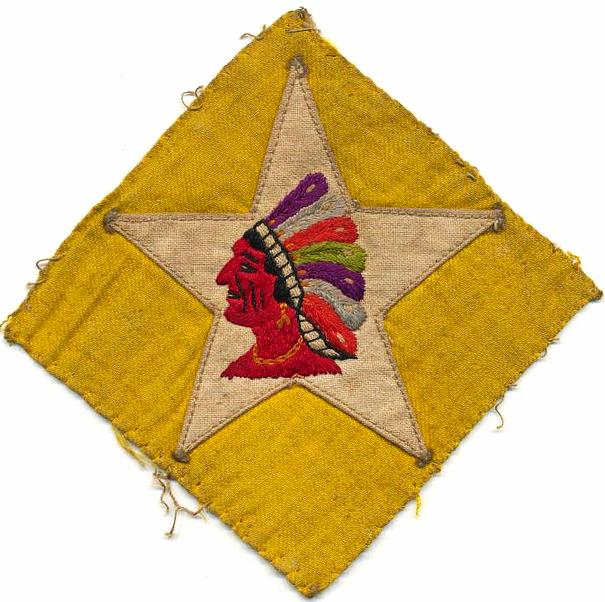
Sergeant Mac Pope (2 Jan 1895 – 3 Oct 1976) was born in Rutherford, Gibson, Tenn., to Louis W. Pope and Rachael Elizabeth “Della” Spenser. He moved to Munford, Tipton County sometime between 1910 and 1917 and worked as a lineman and commercial agent for the Telephone & Telegraph Company in Tipton County. On June 24, 1917, he enlisted in the Marine Corps as a telephone man, joining Headquarters, 6th Marine Regiment and trained at Parris Island, S.C. After his training was complete, he left his home country on the DeKalb on Oct. 19, 1917, for France.
The 6th Marines fought in what is considered the toughest and bloodiest battles and suffered heavy casualties. For their actions at Bella Wood, Soissons, and Blanc Mont, the 6th Marine Regiment was awarded the French Croix de Guerre three times, and the regiment is authorized to wear the fourragère (a braided cord) of the Croix de Guerre with their uniform, one of only two units in the United States Marine Corps authorized to do so.
While the armistice was signed on Nov. 11, 1918, Pope and his unit were assigned to spearhead the Allied march from France through Belgium and Luxembourg to Germany. They continued to provide an occupation presence until the treaties formally ending WWI were signed in June 1919, which then, his unit left Brest, France on July 27, sailing on the Wilhelmina for the United States, arriving Aug. 6, 1919, at Hoboken, New Jersey.
Pope wrote the below letter, a detailed, battle-line description of his time spent in France during the first World War in 1918 to his friend Jack, here in Tipton County, who gave it to the Covington Leader to publish, which they did, more than a hundred years ago on March 6, 1919.
Upon return back to the U.S., Sgt. Pope was discharged on Aug. 19, 1919, and moved to Dallas, Texas, where his parents and siblings were now living. In 1922, he married Jennie Smith and they moved to Uvalde, Texas, where they raised a daughter, Barbara Jean, and Mac continued to work for the telephone company, retiring as a Supervisor.
Sgt. Mac Pope, USMC, died on Oct. 3, 1976, in San Antonio, Texas of lung cancer at the age of 81. He is buried in Sunset Memorial Park, San Antonio, Texas.
Semper Fi Devil Dog!
From Mac Pope
Leutendorf [sic], Germany,
December 18, 1918
Dear Jack – It isn’t very cold over here, but rains most every day. I am getting along fine and fattening every day. Have a good place to stay – nice, warm room and electric lights. Three of us are with a private family. One of the boys can speak German as good as I can English, so we get along fine. Lots of Rhein [sic] wine.
I can sit here and look across the Rhine, as the water’s edge is only 25 feet from the window. It certainly is beautiful, and reminds me of the old Mississippi, though it is not near so wide.
Are you expecting a big Christmas? I certainly wish I could be home, but it is impossible. Think I’ll be there by February 15, anyway.
Well, Jack, I am going to give you a little of my career in Europe, as you have so often asked me to so and this is my first opportunity to do so. Am sure you will call me a liar before I am through, but I am only going to tell one-ninetieth of my history.
First of all, I landed in St. Nazaire, France, and spent about seven days there. Then I took my first box-car ride, and went to Bordeaux which is a third in size and is in southern France. While in Bordeaux I was on detached duty at Base Hospital No. 6 in the outskirts of the city. I had a good time and was in town three and four times a week. We left there in January and moved near Chaumont for training. In March we went into the trenches near Verdun, where I got my first taste of war. At that time I thought it awful, though it was a playhouse compared to what we got later.
About the middle of May we moved down near Bar le Duc for rest, but found none. After a week we moved by train up north of Paris. A week there and we took camions for Chateau Thierry to stop the drive to Paris. We traveled 36 hours without any eats and arrived a few kilos behind the lines.
The French were still falling back, so the famous Second division went into line June 2, stopped the drive and hurled them back. We lived on reserve rations, consisting of hard bread and monkey meat and what we could pick up for the first week. Believe me, it was 30 degrees hotter than h–ll. There was nothing but a continuous roar of guns for 26 days, and in this time I had my shoes off once, so you can imagine me trying to keep telephone lines in working order. July 4 we were relieved and went to reserve about 10 kilos behind the lines. On the 16th, thinking we were going to Paris for a rest, Gen. Mangin, of the French army, again put us on camions, and we found ourselves on the Soissons front, where we started the ball rolling for the allied offensive on the 18th and 19th. This time we had very little to eat for 48 hours, but we drove them back 11 miles just the same. We were relieved on the 20th and went to the rear near Paris. August 31 we moved again to Nancy by train and went into another trench sector for rest, like Verdun. After 10 days we again went to the rear. September 11 we were put into the First American army and hike to St Mihiel. We hike at night and spent the days in woods. It rained all the time, and we lived in pup tents (if you know what that is), with one blanket.
On the morning of September 12 we again pushed the Huns out of the trenches, driving them 11 kilos by noon, gaining our objective 24 hours ahead of time. Being relieved on the 15th, we stopped for a few days near Toul. A week later we were again near Chalons, having moved again. October 1 we again were put under the French army commanded by Gen. Gunreail, and took camions for the Champagne front.
At daybreak on October 3 we were at it again, getting our objective that day, and captured Blanc Mont ridge, which you have no doubt read about. We were relieved on the 10th, and hiked to the rear.
Then the finish came, so we again crawled in camions for the Argonne. November the first we started out for the Meuse river. When the armistice came we had them across the river and 30 kilos from where we started. So you see my division has done its duty, and I am glad to be a member.
My job in the battles was carrying telephones, etc., for communications. I went over the top six times and I think that is enough.
I can say and tell the truth, and prove, that we (our division) has been more gloriously victorious and gained all objectives with better results than any other division in the American E. F., and never lost an inch. Early on the morning of November 17 we pulled out for the Rhine, crossed the Meuse near Mauzon, France, and crossed the Belgian border on the 18th. The people certainly were glad to see us, and there was nothing too good for them to do for us, and we always had good places to spend the night. Belgium is a very pretty country and looks like the country at home.
On the 21st we pulled into the province of Luxembourg. Luxembourg is very hilly, and the faster we traveled the hillier the land got. We stayed at Raisdorf, Luxembourg, on the 23rd, for seven days’ rest, and pulled out again on December 1 for Germany, crossing the border the same day. After being on the road for four or five days, we traveled along the Aks river, and followed it to the Rhine. Friday, the 13th, we crossed the river on the ferry Hindenburg, and located in the town I am in now. This country is nothing but mountains, and the most beautiful scenery I ever looked at.
Jack, I’ve told you just a few things, as it would take too long to write it all, So I’ll tell you the rest when I see you, which I hope will be soon. Be good and remember me as your true friend
CPL Mac Pope, H.D. 6th Reg., U.S.M.C., A.E.F.

